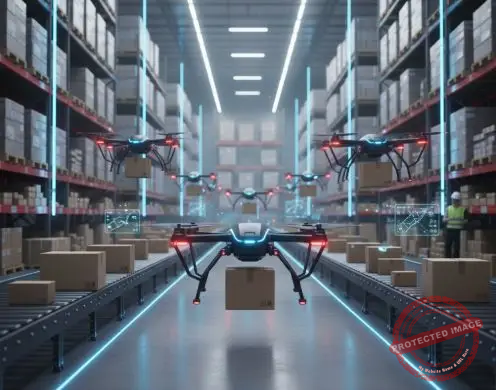Why regulators, customers, and brands are converging to make low-carbon logistics the default setting for online retail.
From Fast and Free to Fast, Free, and Low-Carbon
For a decade, “fast and free” was the dominant mantra in eCommerce shipping. In 2026, a third element is quickly becoming non-negotiable: low-carbon. Consumers are increasingly aware that rapid shipping has a climate price tag, and regulators are moving to ensure that price is no longer hidden. The International Maritime Organization’s revised greenhouse gas strategy in 2023 set an ambition for net-zero emissions from ships around mid-century, with targets for reducing carbon intensity by 2030 and ramping up adoption of zero or near-zero emission fuels. International Maritime Organization+
Parallel moves toward global carbon pricing on shipping emissions, along with draft regulations for mandatory marine fuel standards and greenhouse gas pricing, are signaling that low-carbon logistics is shifting from voluntary corporate social responsibility to a regulated requirement. International Maritime Organization. For eCommerce brands, this means the shipping line on their P&L will increasingly reflect not only carrier fees but embedded carbon costs and penalties.
Alternative Fuels and Smarter Routes
At sea, shipping lines and fuel suppliers are experimenting with alternative fuels such as biofuels made from used cooking oil, methanol, and ammonia, seeking substantial lifecycle emission reductions compared with conventional marine fuels. In 2024, TotalEnergies supplied its first cargo of 100 percent biofuel for ships in Singapore, made entirely from used cooking oil and certified to reduce greenhouse gas emissions by up to 80–90 percent on a life-cycle basis. Reuters
Meanwhile, pilot projects in ammonia-powered vessels and green methanol container ships point to a future in which e-commerce freight will move on dramatically cleaner oceans. AP News+1 However, fuels alone are not the solution. Advanced route optimization and slow-steaming strategies, informed by AI and weather routing, can materially reduce emissions per parcel without sacrificing customer service in many lanes.
For e-commerce shippers, this opens a design space at checkout: offering delivery options that are transparently labeled not only by speed and price but by carbon impact. A three-day “green slot” that consolidates shipments onto slower but cleaner services could be priced attractively, especially for non-urgent categories. Early experiments suggest that when presented with clear, trustworthy information, a significant portion of customers will opt for greener options, particularly if they are paired with loyalty incentives.
Decarbonizing the Last Mile
The last mile is often the most visible—and emotionally charged—part of the shipping journey. Delivery vans double-parked on city streets, congestion in residential neighborhoods, and parcel pileups in lobbies all contribute to a sense that eCommerce convenience comes at a local environmental cost.
Advanced shipping strategies for 2026 focus on electrification, micro-fulfillment, and automated last-mile robotics to tackle this challenge. Electrified delivery fleets, supported by dynamic route optimization software, can reduce fuel consumption and emissions while maintaining or even improving delivery times. NextBillion.ai+1 Micro-hubs located closer to consumers shorten routes and enable cargo bikes and autonomous delivery robots to handle short-range drops, further shrinking the carbon footprint per package.
Research on sustainable last-mile distribution with autonomous delivery robots suggests that carefully designed routing and fleet strategies can produce meaningful environmental gains, particularly in dense urban areas where traditional vans struggle with congestion. ScienceDirect As these solutions mature, the carbon intensity of the last mile could fall sharply, even as parcel volumes continue to rise.
Supply Chain Transparency and Carbon Accounting
One of the most important enablers of sustainable shipping is credible measurement. Brands cannot manage what they cannot see. Digital platforms are emerging that integrate carrier data, fuel types, route information, and shipment weights into real-time carbon dashboards. These tools allow eCommerce companies to measure emissions per order, per lane, and per carrier, turning climate impact into a core performance metric rather than a periodic ESG footnote.
Regulators and investors are also pushing for more rigorous and standardized emissions reporting across supply chains. For e-commerce merchants that ship cross-border, this will mean aligning with multiple regulatory regimes and data standards simultaneously. Those that invest early in digital emissions accounting will be better positioned to comply with new reporting rules and to negotiate more effectively with carriers about low-carbon service levels and pricing.
The Brand and Customer Narrative
Perhaps the most underestimated dimension of sustainable shipping is its impact on brand narrative. Customers increasingly want to know not just what they are buying, but how it reached them. In this context, advanced shipping becomes a storytelling channel.
Brands are beginning to present emissions savings at checkout, highlight the use of low-carbon fuels on product detail pages for imported goods, and share stories of electrified last-mile pilots or port decarbonization partnerships. Some are experimenting with “climate badges” for orders that meet certain thresholds, such as delivery via an electric vehicle or consolidation into a single, low-carbon shipment.
As climate impacts and regulatory frameworks intensify over the next few years, retailers that treat sustainable shipping as a marketing veneer will struggle. Those that embed carbon intelligence into their logistics decisions and communicate honestly about trade-offs—such as why a slightly slower, consolidated shipment is better for the planet—can build trust and differentiate in crowded markets.
Closing Thoughts and Looking Forward
Sustainable shipping for e-commerce is rushing from an optional add-on to a structural feature of the logistics system. The combination of global regulations, evolving fuels, AI-driven route optimization, and electrified last-mile solutions is rewriting what “fast and free” can mean. By 2026, the most advanced eCommerce shipping strategies will be those that can deliver on three promises at once: speed, reliability, and measurable carbon reduction. Brands that align these capabilities with transparent customer communication will not only stay compliant; they will earn loyalty in an era where climate credibility is as important as convenience.
References
2023 IMO Strategy on Reduction of GHG Emissions from Ships – International Maritime Organization – https://www.imo.org/en/ourwork/environment/pages/2023-imo-strategy-on-reduction-of-ghg-emissions-from-ships.aspx
Reducing Emissions from the Shipping Sector – European Commission Climate Action – https://climate.ec.europa.eu/eu-action/transport-decarbonisation/reducing-emissions-shipping-sector_en
IMO Approves Net-Zero Regulations for Global Shipping – International Maritime Organization – https://www.imo.org/en/mediacentre/pressbriefings/pages/imo-approves-netzero-regulations.aspx
TotalEnergies Supplies its First 100% Cooking Oil-Based Marine Fuel in Singapore – Reuters – https://www.reuters.com/sustainability/climate-energy/totalenergies-supplies-its-first-100-cooking-oil-based-marine-fuel-singapore-2024-08-12/
Net-Zero Shipping: Key Findings from the Latest Maritime Forecast – DNV – https://www.dnv.com/expert-story/maritime-impact/net-zero-shipping/
Author: Claire Gauthier – eCommerce Technologies, Montreal, Quebec
Co-Editor: Peter Jonathan Wilcheck – Miami, Florida
#SustainableShipping #GreenLogistics #LowCarbonDelivery #eCommerceSustainability #AlternativeFuels #MaritimeDecarbonization #ElectricDelivery #LastMileInnovation #CarbonAccounting #ClimatePositiveCommerce
Post Disclaimer
The information provided in our posts or blogs are for educational and informative purposes only. We do not guarantee the accuracy, completeness or suitability of the information. We do not provide financial or investment advice. Readers should always seek professional advice before making any financial or investment decisions based on the information provided in our content. We will not be held responsible for any losses, damages or consequences that may arise from relying on the information provided in our content.





 AMD
AMD TMC
TMC IE
IE MSI
MSI NOK
NOK DELL
DELL ECDH26.CME
ECDH26.CME